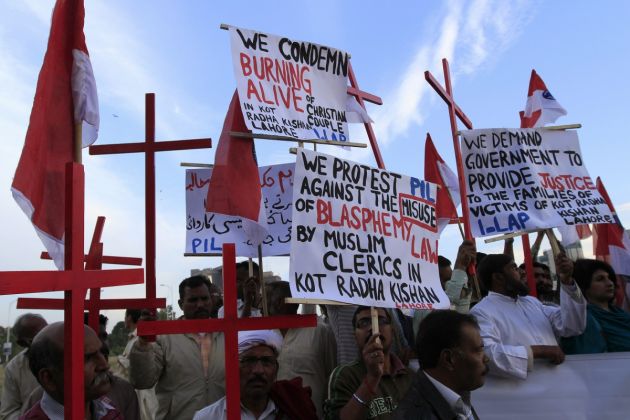Christmas could be uneasy for Pakistan's Christians after Asia Bibi's release

A court acquitted Asia Bibi of blasphemy in October, but she will still be in protective custody in Pakistan over Christmas.
A court acquitted Asia Bibi of blasphemy in October, but she will still be in protective custody in Pakistan over Christmas.
However, although the verdict said the mother of five was liberated, anger erupted from extremists and fundamentalist Muslim quarters in Pakistan, protests erupting in the country's major cities.
"She'll be spending Christmas in a closed room with her husband," said Wilson Chowdhry of the British Pakistani Christian Association, LifeSiteNews reported.
Bibi, 53, is the Catholic Pakistani woman who was acquitted of blasphemy by Pakistan's Supreme Court on October 31.
NO EVIDENCE TO SUPPORT CHARGE
She was a farm laborer accused by Muslim villagers of insulting the Prophet Muhammad in a row over a cup of water. The supreme court judgment said there was no evidence to support the charge.
After her acquittal, however, there was mass unrest led by an Islamist political party in the overwhelmingly Muslim-majority country.
The extremists want to overturn Bibi's acquittal and ensure her execution forcing her, her husband, and her family into hiding, protected from would-be lynchers by the government.
The family of Bibi, who spent eight years on death row in Pakistan, said extremists going house to house were hunting them down with their photographs to try to track them down, refusing to accept the court verdict.
Bibi's family have been in hiding since her acquittal, The Guardian reported.
Her protective custody is part of a deal between the government and a hardline Islamic party, under which violent protests were called off during a review of the court ruling.
Bibi's lawyer, relatives, and supporters have appealed for the family to be given asylum in a European or North American country.
Several countries have said they are prepared to offer a home, but nothing concrete has emerged.
Canada, Spain, and France are thought to have offered asylum to Bibi. Germany and Italy have reportedly held talks with Pakistan on the issue, said The Guardian.
It reported that the UK government has declined to answer questions about whether it is considering an offer of asylum, saying it does not want to endanger Bibi and her family.
The former foreign secretary Boris Johnson and many other lawmakers have called for the UK government to act. Some reports have suggested that the government fears a backlash among British Muslims of Pakistani heritage if it offers Bibi asylum.
Bibi's lawyer fled Pakistan shortly after the court ruling saying his life was in danger.
On Dec. 19 Christianity Today ran a story headlined, "Not Just Asia Bibi: Pakistan's Very Vulnerable Christians."
More than 96 percent of Pakistan's 207 million people are Muslims, and most of them Sunni. Christianity Today said the country is a challenging place for the Christian and Ahmadiyya communities.
It ranks No. 5 on the 2018 World Watch List of the 50 countries where it's hardest to be a Christian.
COUNTRY OF PARTICULAR CONCERN
The U.S. Commission on International Religious Freedom also classifies Pakistan as a Tier 1 Country of Particular Concern.
It recently forced out 18 international non-governmental organizations, including the Christian nonprofit World Vision.
"The reality is that most of the country's Christians are people who historically are from a lower caste system, which although officially abolished, still exists in the country, says Michael James Nazir-Ali, a former Anglican bishop in the Church of England, who was born in Pakistan," said Christianity Today.
"The bulk of the Christian population comes from these people who were landless, casual labor, just as Asia Bibi is, and were discriminated against and despised by many of the wealthier people around," said Nazir-Ali.
The Daily Telegraph reported on Dec. 18, "Pakistani Christians face an uneasy Christmas in the wake of Asia Bibi's release" noting that two Christian brothers have now been sentenced to death for web blasphemy in Pakistan
Qaiser and Amoon Ayub from Lahore were sentenced to hang by a district judge after they were convicted of insulting the Prophet Muhammad in articles and portraits posted on their website.
The brothers fled Pakistan after being accused of the crime in 2011 but eventually returned home.
Amoon, 38, was then arrested at the airport trying to leave the country a second time and Qaiser, 44, was also held. The pair has been in Jhelum prison since 2014.
Both men were convicted last week of the "use of derogatory remarks in respect of the Holy Prophet," under strict blasphemy punishments covered by Pakistan's penal code.
"The prosecution has proved its case against both the accused beyond the shadow of reasonable doubt," Judge Javed Iqbl Bosal concluded in a 28-page ruling. He said, "Hence, both the convicts are to be sentenced to death."
Public support for the strict blasphemy laws is strong and hardline politicians have often backed severe punishments, partly as a way of shoring up their support base.
But human rights groups have long asserted that the laws have often been used to get revenge after personal disputes, and that convictions are based on thin evidence.
Most those convicted are Muslims or members of the Ahmadi community, but since the 1990s, scores of Christians have been convicted.